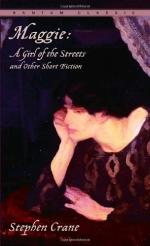“Hully gee! Dey makes me tired,” he said. “Mos’ e’ry day some farmer comes in an’ tries teh run deh shop. See? But dey gits t’rowed right out! I jolt dem right out in deh street before dey knows where dey is! See?”
“Sure,” said Jimmie.
“Dere was a mug come in deh place deh odder day wid an idear he wus goin’ teh own deh place! Hully gee, he wus goin’ teh own deh place! I see he had a still on an’ I didn’ wanna giv ’im no stuff, so I says: ‘Git deh hell outa here an’ don’ make no trouble,’ I says like dat! See? ‘Git deh hell outa here an’ don’ make no trouble’; like dat. ‘Git deh hell outa here,’ I says. See?”
Jimmie nodded understandingly. Over his features played an eager desire to state the amount of his valor in a similar crisis, but the narrator proceeded.
“Well, deh blokie he says: ‘T’hell wid it! I ain’ lookin’ for no scrap,’ he says (See?), ‘but’ he says, ’I’m ’spectable cit’zen an’ I wanna drink an’ purtydamnsoon, too.’ See? ‘Deh hell,’ I says. Like dat! ‘Deh hell,’ I says. See? ‘Don’ make no trouble,’ I says. Like dat. ‘Don’ make no trouble.’ See? Den deh mug he squared off an’ said he was fine as silk wid his dukes (See?) an’ he wanned a drink damnquick. Dat’s what he said. See?”
“Sure,” repeated Jimmie.
Pete continued. “Say, I jes’ jumped deh bar an’ deh way I plunked dat blokie was great. See? Dat’s right! In deh jaw! See? Hully gee, he t’rowed a spittoon true deh front windee. Say, I taut I’d drop dead. But deh boss, he comes in after an’ he says, ‘Pete, yehs done jes’ right! Yeh’ve gota keep order an’ it’s all right.’ See? ‘It’s all right,’ he says. Dat’s what he said.”
The two held a technical discussion.
“Dat bloke was a dandy,” said Pete, in conclusion, “but he hadn’ oughta made no trouble. Dat’s what I says teh dem: ‘Don’ come in here an’ make no trouble,’ I says, like dat. ‘Don’ make no trouble.’ See?”
As Jimmie and his friend exchanged tales descriptive of their prowess, Maggie leaned back in the shadow. Her eyes dwelt wonderingly and rather wistfully upon Pete’s face. The broken furniture, grimey walls, and general disorder and dirt of her home of a sudden appeared before her and began to take a potential aspect. Pete’s aristocratic person looked as if it might soil. She looked keenly at him, occasionally, wondering if he was feeling contempt. But Pete seemed to be enveloped in reminiscence.
“Hully gee,” said he, “dose mugs can’t phase me. Dey knows I kin wipe up deh street wid any t’ree of dem.”
When he said, “Ah, what deh hell,” his voice was burdened with disdain for the inevitable and contempt for anything that fate might compel him to endure.
Maggie perceived that here was the beau ideal of a man. Her dim thoughts were often searching for far away lands where, as God says, the little hills sing together in the morning. Under the trees of her dream-gardens there had always walked a lover.




